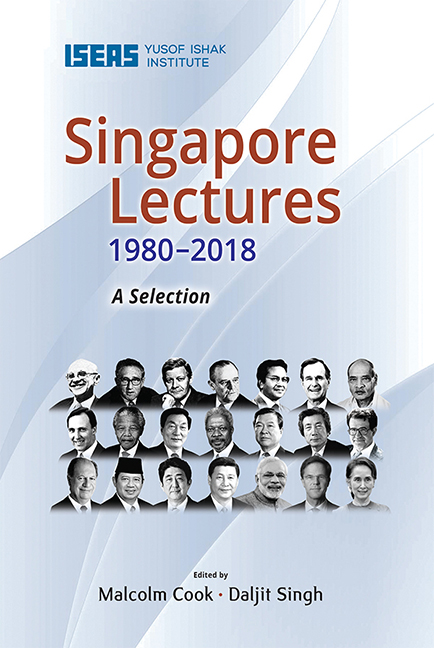Book contents
- Frontmatter
- Contents
- Introduction
- 1 The Invisible Hand in Economics and Politics
- 2 American Foreign Policy: A Global View
- 3 The Soviet Union: Challenges and Responses as Seen from the European Point of View
- 4 Trends in the International Financial System
- 5 Regionalism, Globalism and Spheres of Influence: ASEAN and the Challenge of Change into the 21st Century
- 6 US Policy in the Asia-Pacific Region: Meeting the Challenges of the Post-Cold War Era
- 7 India and the Asia-Pacific: Forging a New Relationship
- 8 Australia, Asia and the New Regionalism
- 9 South and Southern Africa into the Next Century
- 10 China and Asia in the New Century
- 11 Global Values: The United Nations and the Rule of Law in the 21st Century
- 12 Peace on the Korean Peninsula and East Asia
- 13 Japan and ASEAN in East Asia: A Sincere and Open Partnership
- 14 EU and Asia: Sharing Diversity in an Inter-regional Partnership
- 15 Global Challenges in the 21st Century: A View from Chile
- 16 Indonesia: The Challenge of Change
- 17 Japan and ASEAN, Always in Tandem: Towards a More Advantageous Win-Win Relationship through My “Three Arrows”
- 18 Forging a Strong Partnership to Enhance Prosperity of Asia
- 19 India’s Singapore Story
- 20 The Netherlands, Singapore, Our Regions, Our World: Connecting Our Common Future
- 21 Democratic Transition in Myanmar: Challenges and the Way Forward
- The Singapore Lecture Series
- The Editors
16 - Indonesia: The Challenge of Change
Published online by Cambridge University Press: 09 October 2021
- Frontmatter
- Contents
- Introduction
- 1 The Invisible Hand in Economics and Politics
- 2 American Foreign Policy: A Global View
- 3 The Soviet Union: Challenges and Responses as Seen from the European Point of View
- 4 Trends in the International Financial System
- 5 Regionalism, Globalism and Spheres of Influence: ASEAN and the Challenge of Change into the 21st Century
- 6 US Policy in the Asia-Pacific Region: Meeting the Challenges of the Post-Cold War Era
- 7 India and the Asia-Pacific: Forging a New Relationship
- 8 Australia, Asia and the New Regionalism
- 9 South and Southern Africa into the Next Century
- 10 China and Asia in the New Century
- 11 Global Values: The United Nations and the Rule of Law in the 21st Century
- 12 Peace on the Korean Peninsula and East Asia
- 13 Japan and ASEAN in East Asia: A Sincere and Open Partnership
- 14 EU and Asia: Sharing Diversity in an Inter-regional Partnership
- 15 Global Challenges in the 21st Century: A View from Chile
- 16 Indonesia: The Challenge of Change
- 17 Japan and ASEAN, Always in Tandem: Towards a More Advantageous Win-Win Relationship through My “Three Arrows”
- 18 Forging a Strong Partnership to Enhance Prosperity of Asia
- 19 India’s Singapore Story
- 20 The Netherlands, Singapore, Our Regions, Our World: Connecting Our Common Future
- 21 Democratic Transition in Myanmar: Challenges and the Way Forward
- The Singapore Lecture Series
- The Editors
Summary
President Susilo Bambang Yudhoyono of the Republic of Indonesia gave the 25th Singapore Lecture on 16 February 2005, less than four months into his presidency and less than two months after the devastating Boxing Day tsunami that hit Sumatra. He was introduced by Senior Minister Mr Goh Chok Tong. Yudhoyono was an active foreign policy president and a strong supporter of ASEAN. His lecture focuses on Indonesia's domestic challenges and Indonesia-Singapore relations.
My good friend Prime Minister Lee Hsien Loong; Excellencies; Ladies and Gentlemen.
Dear friends:
Thank you, Senior Minister Goh Chok Tong, for your kind words and for graciously agreeing to chair our session today. We remember you as an able statesman and a good friend of Indonesia, who did exemplary work carrying the baton from Singapore's remarkable leader, Lee Kuan Yew.
I wish to begin by thanking ISEAS for inviting me to give the Singapore Lecture here today. Since having been elected President, I have given several keynote speeches at different forums, but this is the first time since I received my doctorate degree that anyone has asked me to give a “lecture”. As flattering as this is, I do not feel that I am in a position to lecture to an audience made up of Singapore's best brains. In fact, Singapore, being the world's most successful city-state, has a lot to tell the world about the lessons of governance.
I stand here today to speak about “the challenge of change for Indonesia”.
All of you in Singapore know the meaning of “change” very well. I know of no other country in the world which has changed as rapidly and as frequently as Singapore. In the last few decades, you have transformed this island into a modern city-state, a world-class trading, manufacturing, financial centre, thus making Singapore relevant—relevant to the region, relevant to the world economy.
There are many ways to measure “greatness” in a nation, but history tells us that the measure of a country's greatness lies in its ability to adapt—adapt to changing times, adapt to new challenges, adapt to emerging trends, adapt to new terrains.
- Type
- Chapter
- Information
- Singapore Lectures 1980-2018 , pp. 237 - 243Publisher: ISEAS–Yusof Ishak InstitutePrint publication year: 2020

